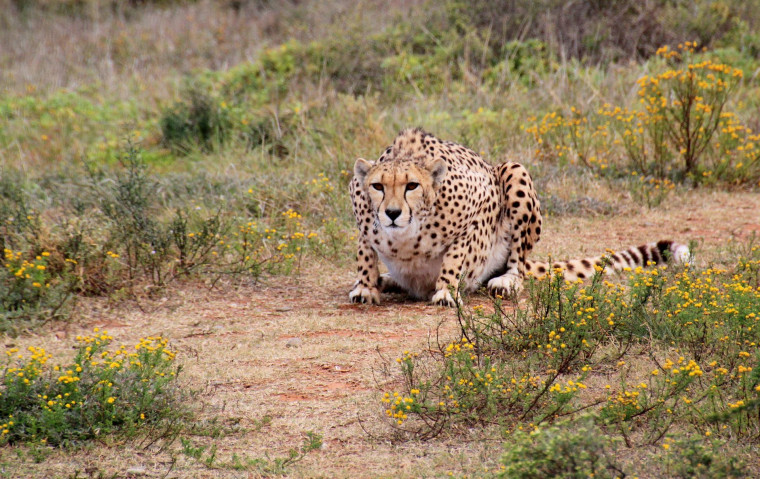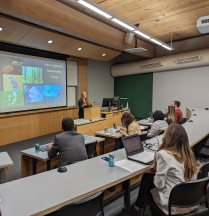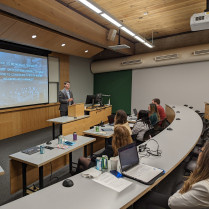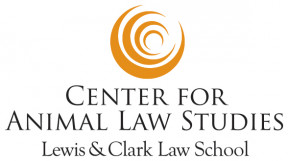Improving International Protections for Wild Animals
Open gallery

What is “wildlife”? Too often in our work we take mutual understanding for granted and we make assumptions, but sometimes questions are asked that probe the most fundamental of concepts. Professor Tanya Wyatt of Northumbria University has spent a year studying this question, and she shared her expertise via a recent visit to Lewis & Clark Law School. The Workshop—Wildlife and the Law: Implications and Ways Forward—co-hosted by Professor Wyatt, the Center for Animal Law Studies (CALS), and Lewis & Clark Law School’s Environment, Natural Resources, and Energy Law Program, pushed participants to think critically about what we perceive wildlife to be and how we conceptualize it in the law.
The global wildlife trade has been given increasing attention in recent years, and the COVID-19 pandemic has more people than ever talking about our relationship with animals. Debates are ongoing as to how to strengthen and possibly even reform the current international legal framework in order to mitigate the risks connected to legal trade and to effectively tackle its illegal dimension. The Workshop was designed as an in-depth exploration regarding how wildlife can better be protected. With this goal in mind, Professor Wyatt and the Global Law Alliance for Animals and the Environment (GLA), along with Lewis & Clark Law JD clinic students and a team of CALS international Animal Law LLM students, workshopped the “What is Wildlife” question from an animal focused vantage point. Through international perspectives, workshop participants drew out some of the ways legal constructs impact our efforts to combat wildlife trafficking.


Three international Lewis & Clark Law Animal Law LLM candidates then shared perspectives from their home countries. Vanessa Gishkow Garbini shared that under Brazil’s constitution all flora and fauna enjoy certain rights but that under statutory law, the concept of wildlife is a more limited concept, meaning that only certain animals are protected as wildlife in Brazil. Yvonne Gurira shared that in Zimbabwe legal definitions of wildlife have affected the ability of prosecutors to successfully prosecute certain wildlife cases, especially where evidence is limited as to the specific origin of certain wildlife products. Marcia Condoy Truyenque noted that in Peru, differences exist across laws that are intended to protect animals, including both wildlife law and welfare laws.

Workshop participants then discussed in small groups the limitations and potential of the law as it is currently established and the possibilities for systemic legal reform in light of the extinction crisis and growing awareness and recognition of the need for a One Health approach to wildlife protection.
Importantly, all participants agreed that systemic legal reform must run in parallel with policy efforts to support a just transition away from wildlife exploitation. Inspired by the Workshop, students are excited to put these principles into practice to improve protections for wild animals. Thank you to Professor Wyatt for facilitating this engaging discussion and sharing your expertise with our students, and to the United Kingdom Arts and Humanities Research Council funding for making it possible.
About
The Center for Animal Law Studies and Environmental Law Program at Lewis & Clark Law School created the Global Law Alliance for Animals and the Environment (Global Law Alliance) as champions for wild animals and wild spaces across the globe.
The Center for Animal Law Studies

The Environmental, Natural Resources, and Energy Law Program
Lewis & Clark Law School’s Environmental, Natural Resources, and Energy Law program is number one in the country according to the U.S. News and World Report rankings and has occupied a top slot in the US News rankings for some 25 years. Founded in 1970, the same year of the first Earth Day and the launch of major federal environmental legislation, the program is celebrating its 50th year in 2020. The program offers over 45 courses in environmental law, including two clinics, the Global Law Alliance and a domestic litigation clinic, Earthrise Law Center, and houses the Green Energy Institute which works to further the transition to a 100% renewable energy grid. It offers two two certificates for JDs focusing on environmental issues and energy issues and also offers a LLM degree and a Master of Studies degree for non-lawyers (both of which can be completed on campus or online).
More Center for Animal Law Studies Stories
Center for Animal Law Studies is located in Wood Hall on the Law Campus.
MSC: 51
email cals@lclark.edu
voice 503-768-6960
Center for Animal Law Studies
Lewis & Clark Law School
10101 S. Terwilliger Boulevard MSC 51
Portland OR 97219

